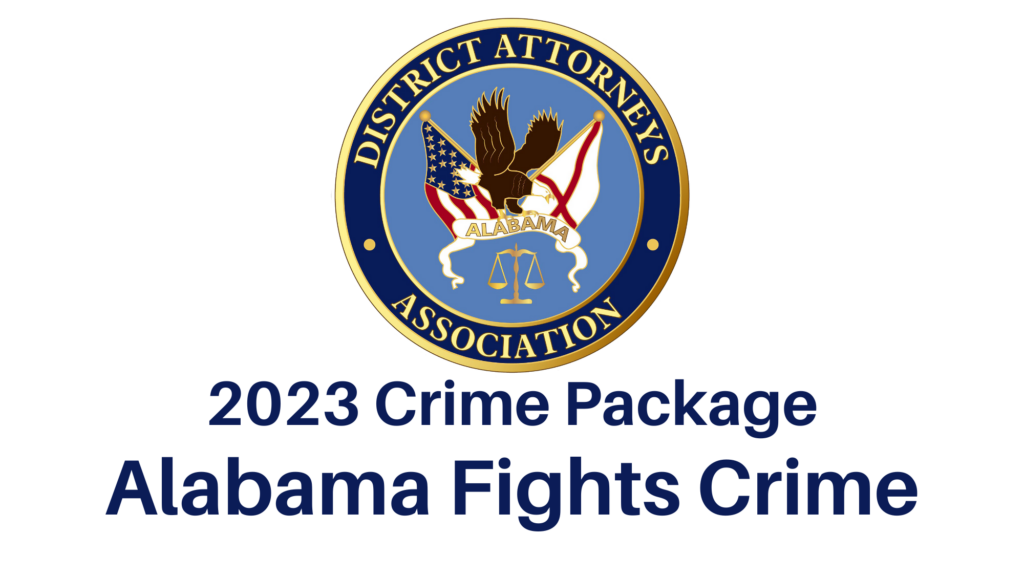
We at the ADAA are excited to see the support around our crime package; these bills address different aspects of crime and punishment in Alabama. The proposed legislation reflects the needs of our communities and the ongoing efforts to make Alabama a safer place to live for all.
To read the Bills in full, you can visit the Alabama Legislature’s Website.
ORGANIZED RETAIL THEFT
Organized retail Crime is a 100-billion-dollar criminal enterprise. It is a multinational system facilitated by organized crime syndicates and cartels, with the profits used to facilitate other crime such as human trafficking, drug trafficking and terrorism. Many businesses are
shuttering, facing large revenue losses, limiting employee pay, or being forced to pass the losses from theft to consumers. Make no mistake, this is an Alabama problem, that cost Alabama jobs, and this is an Alabama solution.
Currently, Alabama has a giant neon sign welcoming organized crime into our state, because we do not have laws to address the specific aspects of organized crime. The leadership structure is all but immune and they know it. This will be a vital tool for business, law enforcement and prosecutors to protect Alabama business and Alabama workers.
ORGANIZED RETAIL THEFT HOUSE BILL
HB288 – Rep. Treadaway
The bill creates several new offenses for retail theft and organized retail theft to address the issues of massive thefts from retail stores. Retail theft is defined in a way to address the prolific issues related to massive retail shoplifting and retail theft. It addresses the various means and methods used by those conducting systematic and organized theft from retail merchants.
Also, organized retail theft bill is created to allow for the prosecution of all the participants in groups who are stealing retail merchandise and reselling it for a profit. The bill provides for jurisdiction and procedures that will help retail theft in the charging and prosecution of these types of retail theft.
This bill also creates an alternative theft statute of Retail Theft, that specifically address the motives, methods, and processes of retail crime. It will help everyday law-abiding citizens, by allowing retail loss prevention professionals and law enforcement to focus on the thief and their specific methods of stealing goods and merchandise. This statute will be supported by the local district attorney’s office, giving better access and resources for prosecution as well.
CLASS D FELONY
In 2015, the Class D felony was created, which split the sentencing range of the Class C felony. The Class D covers crime like theft of $500 to less than $1,500 dollars, theft or use of a stolen credit card, forgery of a check(s), etc. However, the public might be shocked to learn that a class D felon is immune to even the threat of jail time. This means that any individual could steal $1,400 a dozen times over a month or less and face only one sentence that cannot even be threatened with jail. This anomaly in the law has led to the near collapse of programs like drug courts. This leads to continued crime, fed by addiction and mental health issues that had previously been addressed in these programs. We were not sending low level property offenders to prison before 2015 and we are seeking to do that now. We simply feel it is obscene to have zero accountability for a felony offense, especial when the misdemeanor can go to jail for up to a year. That is right, steal $500.00 and you can serve up to a year. Steal $501.00 and you are free and clear.
We have two separate bills that seek to address the Class D felony. One is a Senate bill, and one is in the House.
They are as follows:
CLASS D FELONY SENATE BILL
SB198 – Rep. Orr
The bill amends several code sections related to the Class D felony created by the Justice Reinvestment Act of 2015. The Act directs the Sentencing Commission to immediately adopt modifications to the sentencing standards to reflect the amendments in these statutes.
The bill retains Class D felonies with a sentencing range of one year and one day to five years for first offenses. The bill removes the sentencing restrictions found in §§ 13A-5-6, 13A-5-9 and 15-18-8 with respect to both Class C and Class D felonies that will allow a court to sentence someone charged with a Class D felony to jail or prison. It includes Class D felonies in the inchoate crimes of attempt, solicitation, and conspiracy. The Habitual Offender Act § 13A-5-9 is amended so that all felonies will have a consistent sentencing and enhancement structure under these statutes, simplifying the sentencing schemes for both Class C and Class D felonies.
The split sentence requirements in § 13A-5-6 for Class C felonies are removed so straight sentences are allowed for first time offenders. Split sentence authorized in § 15-18-8 are restored to the structure in place prior to the Justice Reinvestment Act and any sentence for a Class A, Class B, Class C or Class D felony with a sentence of 15 years or less will be up to 3 years and sentences of 15 and a day to 20 years will be 3 to 5 years.
CLASS D FELONY HOUSE BILL
HB271 – Rep. Sells
The bill amends a number of code sections related to the repeal of the Class D felony created by the Justice Reinvestment Act of 2015. The Act directs the Sentencing Commission to immediately adopt modifications to the sentencing standards to reflect the amendments in these statutes.
The split sentence requirements in § 13A-5-6 for Class C felonies is removed so straight sentences are allowed for first time offenders. The values in the theft and receiving stolen property statutes are restored to $2,500 or more is a Class B felony, $500+ to $2,500 is a Class C felony and up to $500 is a Class A misdemeanor. Unlawful possession of marijuana has been amended to resemble progression of the DUI increased penalties, which will allow the first three convictions for UPOM 2 are Class A misdemeanors and fourth and subsequent will be Class C felonies. Split sentence authorized in § 15-18-8 are restored to prior to the Justice Reinvestment act and any sentence for a Class A, Class B or Class C felony with a sentence of 15 years or less will be up to 3 years and sentences of 15 and a day to 20 years will be 3 to 5 years.
FIRST RESPONDER PROTECTION ACT
HB230 – Rep. Simpson
The bill creates § 13A-6-30, chemical endangerment of a first responder. It seeks to add protection for the 1 st responders who are put in harm’s way responding to every level of crime. If a person knowingly, recklessly, or intentionally causes a first responder, defined in § 11-98-1, a coroner or deputy coroner to be exposed to, ingest or inhale or have contact with a Schedule I controlled substance § 20-2-23 or chemical substance defined in § 26-15-2. For the purposes ofthis offense serious physical injury includes exposure, etc., to fentanyl or a fentanyl analogue. Chemical endangerment of a first responder with physical injury is a Class C felony, with serious physical injury is a Class B felony and with death is a Class A felony.
FENTANYL TRAFFICKING
HB1 – Rep. Simpson
This law focuses on the trafficker or business level dealer, not the addict or low-level street dealer.
In 2018, we were successful in creating two class (A) fentanyl trafficking statutes. One addressed a mixture of fentanyl and the other addressed “pure” fentanyl (Single Component). However, because the dangers of fentanyl were not yet understood, the legislature did not add the standard punishment provisions that every other dangerous drug in Alabama has, such as heroin, cocaine, and meth.
This bill (now law) amends Section 13A-12-231 (13) (trafficking fentanyl ‘single component’) to provide for mandatory minimum sentences and incarceration in addition to the existing fines. In HB 1, the minimum sentence incarceration requirements mirror other subdivisions of the trafficking statute and are progressive and increasing as the amount in possession, etc., increase. The weight requirements, mandatory minimum sentences and fines are proposed to be:
1. 1g – 2g – three (3) calendar years, minimum fine of $50,000.
2. 2g – 4g – ten (10) calendar years, minimum fine of $100,000.
3. 4g – 8g – twenty-five (25) calendar years, minimum fine of $500,000.
4. 8g+ – life in prison, minimum fine of $750,000.
MANSLAUGHTER OVERDOSE
HB82 – Rep. Pringle
We currently have an assault statute that addresses this behavior, but if the person dies, we have no adequate remedy at law. Under present Alabama law, a person can intentionally sell fentanyl or other dangerous and deadly drugs, with zero consequence if the person dies because of consuming the dangerous drug. It is prohibited federally and in our border states, but not Alabama.
The bill amends § 13A-6-3, manslaughter, to now include if someone intentionally distributes a controlled substance in violation of § 13A-12-211, and the person to whom the substance is distributed dies as a proximate result of the use of the controlled substance, it would be manslaughter. There is an exemption for doctors, dentists and pharmacists who are practicing their respective specialty.
VIOLENT OFFENDER, CRIMES DANGEROUS TO HUMAN LIFE WITH A FIREARM. SENTENCE ENHANCEMENTS AND NEW CRIMES FOR VIOLENT FELONS
HB301 – Rep. Ingram
This bill is fully vetted with local and national gun rights advocates and is a smart, violent criminal- based approach to stopping gun violence. It sets out a list of crimes that are obviously dangerous to human life. If an offender commits one of these violent Class A or B felonies, with a firearm, they are subject to mandatory punishment upon conviction. It would also prohibit the possession of a firearm if a person were on bond for one of these enumerated crimes and are subsequently found guilty of the underlying crime. It would also prohibit anyone from possessing a firearm within 25 years of being convicted of one of these violent crimes clearly dangerous to human life.
This bill creates a sentencing enhancement when a person possesses a firearm during the commission of a felony dangerous to human life. A person who possesses or brandishes a firearm will receive a minimum 10-year sentence enhancement. A person who discharges a firearm will receive a minimum 15-year enhancement. A person who commits a second or subsequent violation will receive a minimum 20-year enhancement. The enhancements are to run consecutive with any other term of imprisonment and are to be served day-for-day.
This bill creates the crime of possession of a firearm after being released on bail or on personal recognizance for the commission of a felony dangerous to human life. A first offense is a Class B felony punishable by a 5-year mandatory minimum sentence. A second or subsequent violation is a Class A felony punishable by a mandatory minimum 10-year sentence. The enhancements are to run consecutive with any other term of imprisonment and are to be served day-for-day.
Lastly, this bill creates the crime of possessing a firearm after being convicted of a felony dangerous to human life. A first offense is a Class B felony punishable by a 5-year mandatory sentence. A second or subsequent violation is a Class A felony punishable by a mandatory minimum 10-year sentence. The enhancements are to run consecutive with any other term of imprisonment and are to be served day-for-day.

